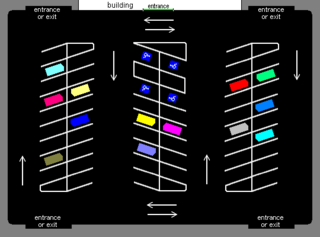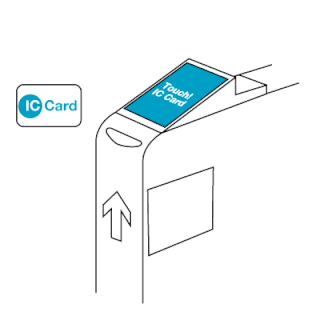
A parking meter is a device used to collect money in exchange for the right to park a vehicle in a particular place for a limited amount of time. Parking meters can be used by municipalities as a tool for enforcing their integrated on-street parking policy, usually related to their traffic and mobility management policies, but are also used for revenue.

A mobile payment, also referred to as mobile money, mobile money transfer and mobile wallet, is any of various payment processing services operated under financial regulations and performed from or via a mobile device, as the cardinal class of digital wallet. Instead of paying with cash, cheque, or credit cards, a consumer can use a payment app on a mobile device to pay for a wide range of services and digital or hard goods. Although the concept of using non-coin-based currency systems has a long history, it is only in the 21st century that the technology to support such systems has become widely available.

Parking is the act of stopping and disengaging a vehicle and leaving it unoccupied. Parking on one or both sides of a road is often permitted, though sometimes with restrictions. Some buildings have parking facilities for use of the buildings' users. Countries and local governments have rules for design and use of parking spaces.

Electronic toll collection (ETC) is a wireless system to automatically collect the usage fee or toll charged to vehicles using toll roads, HOV lanes, toll bridges, and toll tunnels. It is a faster alternative which is replacing toll booths, where vehicles must stop and the driver manually pays the toll with cash or a card. In most systems, vehicles using the system are equipped with an automated radio transponder device. When the vehicle passes a roadside toll reader device, a radio signal from the reader triggers the transponder, which transmits back an identifying number which registers the vehicle's use of the road, and an electronic payment system charges the user the toll.

A parking lot or car park, also known as a car lot, is a cleared area intended for parking vehicles. The term usually refers to an area dedicated only for parking, with a durable or semi-durable surface. In most jurisdictions where cars are the dominant mode of transportation, parking lots are a major feature of cities and suburban areas. Shopping malls, sports stadiums, and other similar venues often have immense parking lots.

The EZ-Link card is a rechargeable contactless smart card and electronic money system that is primarily used as a payment method for public transport such as bus and rail lines in Singapore. A standard EZ-Link card is a credit-card-sized stored-value contact-less smart-card that comes in a variety of colours, as well as limited edition designs. It is sold by TransitLink Pte Ltd, a subsidiary of the Land Transport Authority (LTA), and can be used on travel modes across Singapore, including the Mass Rapid Transit (MRT), the Light Rail Transit (LRT), public buses which are operated by SBS Transit, SMRT Buses, Tower Transit Singapore and Go-Ahead Singapore, as well as the Sentosa Express.

A prepaid mobile device, also known as a pay-as-you-go (PAYG), pay-as-you-talk, pay and go, go-phone, prepay or burner phone, is a mobile device such as a phone for which credit is purchased in advance of service use. The purchased credit is used to pay for telecommunications services at the point the service is accessed or consumed. If there is no credit, then access is denied by the cellular network or Intelligent Network. Users can top up their credit at any time using a variety of payment mechanisms.

A pay and display machine is a type of ticket machine used for regulating parking in urban areas or in car parks. It relies on a customer purchasing a ticket from a machine and displaying the ticket on the dashboard, windscreen or passenger window of the vehicle. Details included on a printed ticket are generally the location and operator of the machine, expiry time, fee paid and time entered.

I-Pass is the electronic toll collection system utilized by the Illinois State Toll Highway Authority (ISTHA) on its toll highways that launched on November 18, 1993, with the opening of Interstate 355. It uses the same transponder as the E-ZPass system used in the Northeastern US, the Chicago Skyway, and the Indiana Toll Road, along with the Indiana State Road 912 Indiana Harbor and Ship Canal bridge.

Open road tolling (ORT), also called all-electronic tolling, cashless tolling, or free-flow tolling, is the collection of tolls on toll roads without the use of toll booths. An electronic toll collection system is usually used instead. The major advantage to ORT is that users are able to drive through the toll plaza at highway speeds without having to slow down to pay the toll. In some installations, ORT may also reduce congestion at the plazas by allowing more vehicles per hour/per lane.
The term mobile commerce was originally coined in 1997 by Kevin Duffey at the launch of the Global Mobile Commerce Forum, to mean "the delivery of electronic commerce capabilities directly into the consumer’s hand, anywhere, via wireless technology." Many choose to think of Mobile Commerce as meaning "a retail outlet in your customer’s pocket."

Network for Electronic Transfers, colloquially known as NETS, is a Singaporean electronic payment service provider. Founded in 1986 by a consortium of local banks, it aims to establish the debit network and drive the adoption of electronic payments in Singapore. It is owned by DBS Bank, OCBC Bank and United Overseas Bank (UOB).

Video tolling is a form of electronic toll collection that uses video or still images of a vehicle's license plate to identify a vehicle liable to pay a road toll. The system dispenses with collection of road tolls using road-side cash or payment card methods, and may be used in conjunction with "all electronic" open road tolling, to permit drivers without an RFID device to use the toll road.
RingGo is a pay by phone parking service, based in the UK owned by EasyPark Group.
Pay-by-plate machines are a subset of ticket machines used for regulating parking in urban areas or in parking lots. They enable customers to purchase parking time by using their license plate number. The machines print a receipt that generally displays the location, machine number, start time, expiration time, amount paid, and license plate.

Apple Wallet is a digital wallet developed by Apple Inc. and included with iOS and watchOS that allows users to store Wallet passes such as coupons, boarding passes, student ID cards, government ID cards, business credentials, resort passes, car keys, home keys, event tickets, public transportation passes, store cards, and – starting with iOS 8.1 – credit cards, and debit cards for use via Apple Pay.
Passport is a United States-based payment service provider headquartered in Wilmington, Delaware with offices in Charlotte, North Carolina. Passport provides an enterprise software platform for cities, transit agencies, universities, and private operators in the parking and transportation industries throughout the U.S. and Canada. Passport’s primary applications include mobile payments for parking and mobile ticketing for transit operations. Passport's software allows municipalities and private operators to charge users for parking without hardware payment stations.
Mobility as a service (MaaS) is a type of service that, through a joint digital channel, enables users to plan, book, and pay for multiple types of mobility services. The concept describes a shift away from personally-owned modes of transportation and towards mobility provided as a service. This is enabled by combining transportation services from public and private transportation providers through a unified gateway that creates and manages the trip, which users can pay for with a single account. Users can pay per trip or a monthly fee for a limited distance. The key concept behind MaaS is to offer travelers mobility solutions based on their travel needs.
Kakao T is a Korean transportation service app launched by Kakao Mobility Corp., a subsidiary of Kakao in 2017. The service provides taxi-hailing, designated driver booking, nearby parking space searching, and real-time traffic information service.
ParkMobile is a mobile and web app providing parking payments in North America. Headquartered in Atlanta, Georgia, users can pay for on-street and off-street parking via app on their smartphone, web browser, or through calling a phone number. ParkMobile also offers parking reservations at stadiums or venues for concerts and sporting events, and in metro area garages.














